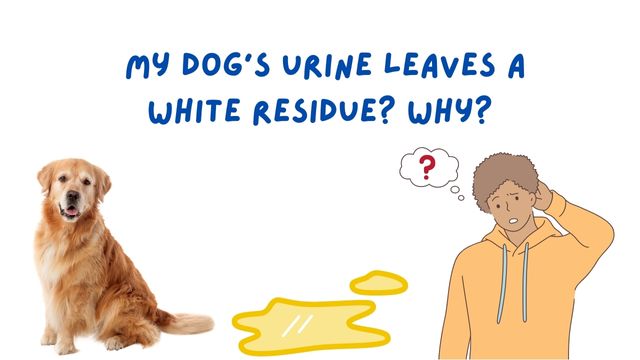Urine is an important excretory product of the body. Through this liquid waste, your dog eliminates toxic chemicals such as urea, uric acid, and creatinine. Because of its importance to the body, changes in pee often indicate a health issue. An example of such change is your dog’s urine leaving a white residue on the floor or your dog’s urine smelling like a skunk.
Urine usually dries up without leaving a stain. Why does your dog’s urine leave a residue, and what does it mean? Should you be worried or take your pet to the clinic? In this article, we discuss all you need to know about this weird occurrence.

Why Does My Dog’s Urine Leave a White Residue?
Urine is liquid waste produced by the kidneys. Through urine, the body eliminates water, electrolytes, salts, minerals, and chemicals that are toxic to the body.
White residue in urine is often mineral sediments or urinary crystals like ammonium urate, struvite, bilirubin, xanthine, silica, cystine, or calcium oxalate. Struvite and calcium oxalate crystals are the most common crystals seen in domestic animals and indicate a urinary infection or excess calcium, respectively.
These crystals form when there are too many minerals but little liquid in urine. Crystalluria (crystals in urine) can occur due to a highly-processed diet, a urinary infection, certain medications like ciprofloxacin and magnesium trisilicate, genetics, dehydration, and many other factors. Crystalluria is also seen in low-activity dogs who are fed an excess protein diet. This kind of diet increases the acidity of urine and reduces the body’s ability to absorb calcium leading to its accumulation in urine.
Some dog breeds are more prone to developing certain crystals in urine. For example, Chihuahuas, Yorkshire Terriers, and Malteses are known to develop calcium oxalate crystals. In rarer cases, this white residue in pee could be pus. This condition is known as pyuria and indicates that there is an infection somewhere in the urinary tract.
Should I Be Concerned if My Dog’s Urine Leaves a White Residue?
Yes, you should be concerned if your dog’s urine leaves a white residue. Your dog’s urine content says a lot about his overall health, so once any change is noted, your spidey senses should tingle. Normally, healthy dog urine should have a straw yellow color and dry off, leaving no residue. The presence of this residue shows that there is an abnormality in your pooch’s urinary tract.
As discussed above, the most likely cause of urine residue is the presence of mineral crystals in pee. This condition is known as crystalluria. Some crystals don’t cause trouble, and the crystal formation will stop once the root cause is eliminated. In other cases, crystalluria acts as a forerunner of bladder stones, so early detection of this condition can save you and your pet from worse health issues.
If this residue is confirmed to be pus, your dog is likely suffering from a lower urinary infection, usually caused by bacteria. If this is untreated, it may lead to discomfort, urethral blockage, generalized illness, and, worse, death. Whatever its cause is, it’s best to get your pet checked and diagnosed by a veterinarian as soon as possible. This will prevent the disease from worsening and help treat the symptoms.
What Should I Do if My Dog Leaves a White Residue in Its Urine?
Even before getting to this section, we have echoed repetitively that the first and best option is to talk to your veterinarian about any health issue. To ease your pet’s discomfort, increase his water intake, as this ensures that the urinary tract is flushed out constantly. Also, watch out for other symptoms like difficulty urinating, signs of discomfort, blood in urine, lethargy, and others. Make sure your pet is well rested, eats a balanced diet, and relieves himself as he pleases.
With your vet’s consent, you should change your pet’s diet to one that has vitamins and nutrients that can help the body fight off infections naturally. Whole foods that contain vitamin B, vitamin C, omega 3, and minerals include vegetables, yogurts, high-quality fish, and raw fruits. Stay away from foods that are known to worsen urinary tract infections, like dairy products, carrots, tomatoes, and others. These foods irritate the urinary organs and increase uterine contractions hence aggravating the infection.
Ask your vet for ways to balance your pet’s pH levels if this is required. In addition to changing your pet’s diet, supplements are a good way to support your pet’s urinary tract. Natural products that contain cranberry, blueberries, echinacea, nettle seed, parsley leaves, and marshmallow roots help to reduce inflammation and cut down bacteria levels. We love this product, and you will too!
Conclusion
A health issue is never a fun experience for pet owners. If your dog’s urine leaves a white residue, reach out to your veterinarian and follow his instructions, make the right dietary changes and give him supplements to ensure that his pee is back to normal. With the right treatment, you will be back to mopping up clear yellow liquid in a matter of weeks.

